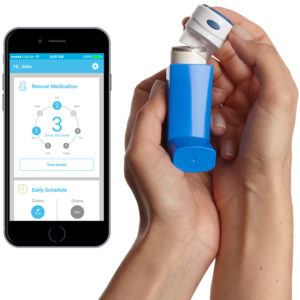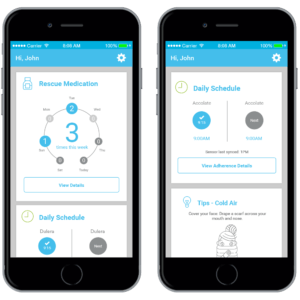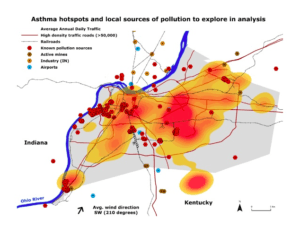Propeller Health: Using Data to Help Patients Manage Their Respiratory Health

Propeller Health helps patients manage their asthma and chronic obstructive pulmonary disease (COPD) with a 'smart inhaler' sensor attachment linked to a data-driven mobile app,
What is Propeller Health? [1]
Propeller Health – Live your life without limits! from Propeller Health on Vimeo.
By using sensors linked to its data-driven mobile app, Propeller Health helps patients manage their asthma and chronic obstructive pulmonary disease (COPD). Without Propeller, patients are unable to easily and accurately track the exact conditions that trigger asthma attacks, simply relying on their inhalers as immediate reactive solutions. With Propeller, patients are now able to gather insights about what causes an asthma attack and ensure this data is synced up their care teams.
 Using Propeller is simple. After an easy five minute enrollment online, Propeller mails a sensor to the patient within two to three days. The patient attaches the Propeller sensor to their inhaler, using their medication as usual, and Propeller continuously monitors the patients’ conditions and gathers data in the background to better advise patients on their environmental conditions and avoid future asthma attacks. Sensor data is transmitted to Propeller’s smartphone mobile app via Bluetooth so patients can manage their own care and cut down on healthcare costs.
Using Propeller is simple. After an easy five minute enrollment online, Propeller mails a sensor to the patient within two to three days. The patient attaches the Propeller sensor to their inhaler, using their medication as usual, and Propeller continuously monitors the patients’ conditions and gathers data in the background to better advise patients on their environmental conditions and avoid future asthma attacks. Sensor data is transmitted to Propeller’s smartphone mobile app via Bluetooth so patients can manage their own care and cut down on healthcare costs.
There are four major types of data Propeller collects:
- Clinical (eg, medications, events, etc.)
- Personal (eg, name, birthdate, etc.)
- Sensor data (sensor ID, battery level, last sync, etc.)
- Aggregated, anonymized location data to inform hot spots for attacks, etc.
Propeller patient data is not sold and is solely used to inform aggregate insights.
What value does Propeller create?
Propeller’s focus on respiratory health is a smart move in the landscape of digital health. By keeping patient behavior the same and simply attaching a sensor to inhalers patients are already using, Propeller is able to capture users and gather their data. Most other companies struggle to keep patients engaged, finding it challenging to build up a strong patient dataset. Unlike most other health tech competitors, however, Propeller has stood apart in terms of its ability to gather mass adoption and successfully build a credible dataset useful for public health.
On an individual patient level, Propeller uses its collected data to derive key insights with personalized and actionable advice to manage their care, such as recommending avoiding certain areas that have triggered attacks for other users.
By utilizing this “smart inhaler” approach, Propeller users have had up to fewer asthma attacks (up to 79% fewer), increased medication adherence (up to 50% more), and better outcomes (up to 50% more symptom free days) [1].
What value does Propeller capture?
With its success, Propeller has been able to amass widespread adoption with 45+ programs signed with top healthcare systems (eg, Dignity Health, Nemours Children’s Health System) and managed care organizations (eg, Molina Healthcare, ChenMed). There has been traction across the healthcare system– pharmaceutical manufacturers appreciate how Propeller increases medication adherence; payors appreciate how Propeller reduces costs of care; providers appreciate how Propeller betters health outcomes [2,3].
With this large-scale patient dataset, Propeller has shown that they are beneficial in terms of both clinical outcomes and financial returns on investments and are capturing value by locking in agreements with employers, payors, and providers.
This data is also being used on a population level, where Propeller has made it possible for public health professionals to track their asthma burden on a community level. In one case, Propeller worked with AIR Louisville to collective real-time data on inhalers and inform public health intervention and policy decisions.
How did Propeller Health get to where it is now? [3,4,5]
Originally called Asthmapolis and founded in 2010, the company rebranded as Propeller Health in 2013, expanding their therapeutic focus to include both asthma and COPD and launching its FDA-cleared sensor in tandem with its synced up mobile app. As is the case in healthcare, Propeller depended on regulatory approval to move forward and from there were able to successfully gain traction in their healthcare space with a solid presence and boots on-the-ground, knocking on doors to lock-in agreements and demonstrate their clinical and financial returns on investment.
While previously, Propeller faced the challenge of generating mass adoption, I believe in the future, Propeller will ultimately face the problem of continuing to grow its business without finding more monetization strategies for its data. With the sensitivities of patient data, I believe Propeller must maintain its promise of patient privacy and instead either needs to continue to rely on further geographical expansion of its core business or find other verticals to play in beyond simply respiratory health.
In the healthcare space in particular, I believe companies that have failed to grow data-driven business models have lacked the ability to build trust with consumers and maintain patient engagement levels, both of which lead to low adoption rates and weak datasets for meaningful analyses. I also think such companies must recognize what sort of insights such data can be used for, informing which pieces of data are most needed for collection. Based on its track record thus far, Propeller Health is on the path to success.
Sources
[1] https://www.propellerhealth.com/
[2] https://techcrunch.com/2016/10/20/asthma-tracking-startup-propeller-health-takes-in-21-5-million-to-continue-growing-the-platform/
[3] http://www.mobihealthnews.com/25255/asthmapolis-now-propeller-moves-beyond-asthma
[4] http://www.fiercebiotech.com/medical-devices/updated-propeller-health-gets-fda-nod-to-sell-app-sensor-gsk-inhalers
[5] http://www.xconomy.com/wisconsin/2015/07/22/fda-clears-2-new-propeller-health-devices-that-track-respiratory-meds/#



Thanks for another interesting post in the healthcare space. How does Propeller make sure to keep patients engaged? Sometimes when people get ahold of these kinds of devices, they feel novel for a short period of time and then wind up in a drawer collecting dust. Is there the potential for Propeller to generate some kind of recurring revenue stream w the device or their anonymized data platform?